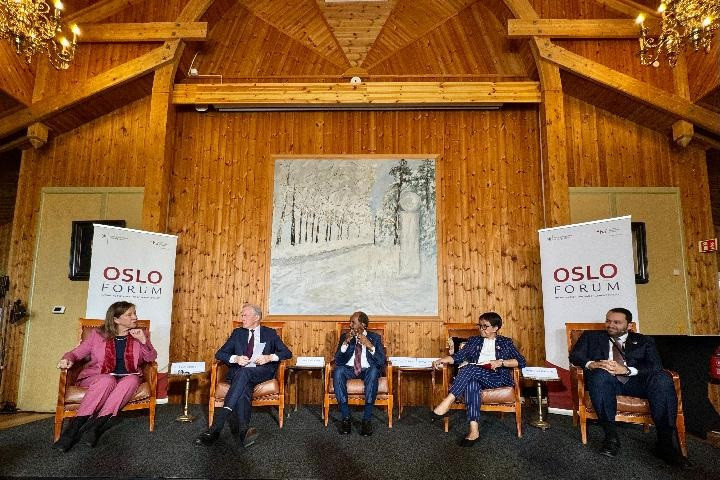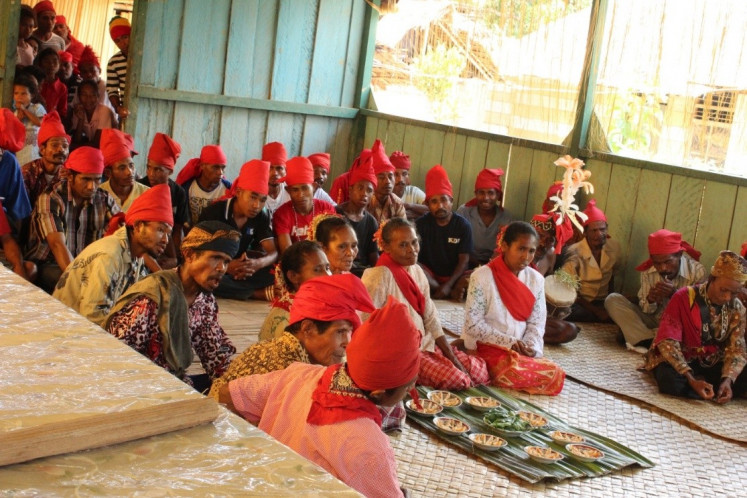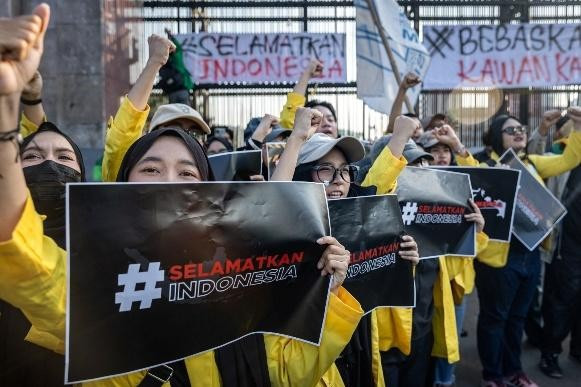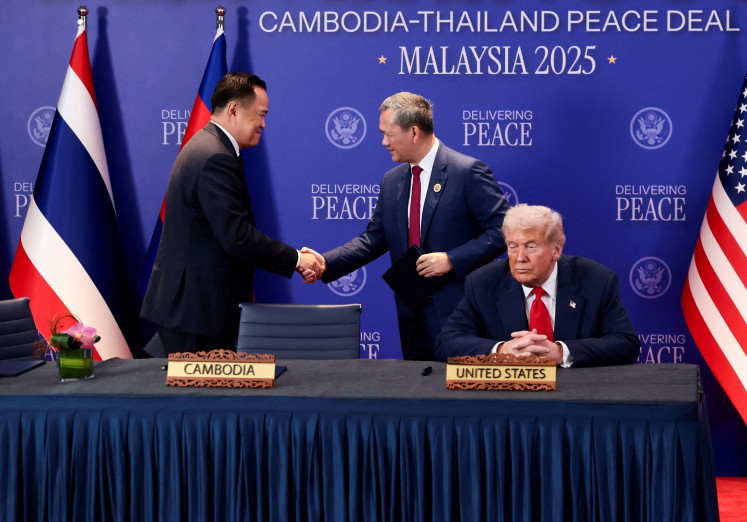Popular Reads
Top Results
Can't find what you're looking for?
View all search resultsPopular Reads
Top Results
Can't find what you're looking for?
View all search resultsPeacemaking in a challenging time, against all odds
Conflicts are difficult to resolve because the conflicting parties are often indulging in a zero-sum game mentality, equating making peace with surrender.
Change text size
Gift Premium Articles
to Anyone
It was a cloudy day in Oslo on Tuesday. I was sitting on a panel discussion with Norway’s Prime Minister Jonas Gahr Støre, Somalian President Hassan Sheikh Mohamud and Qatar’s State Minister Mohammed bin Abdulaziz bin Saleh Al Khulaifi, at the opening plenary of the 2024 Oslo Forum.
The moderator, the BBC’s seasoned journalist Lyse Doucet, skilfully navigated through various topics revolving around this year’s theme, mediation against all odds. This theme accurately reflects today’s situation, as war and conflicts remain ever-prevalent around the globe. And peace has become more elusive.
The Oslo Forum is an annual event cohosted by the Norwegian Foreign Ministry and the Centre for Humanitarian Dialogue, which has been held since 2003. It is a reputable forum where speakers and participants engage in vigorous discussions about mediation and peace efforts. Past participants include global leaders, mediators and representatives of conflicting parties. This year was my fourth time participating in the event.
The fact that Indonesia was invited to sit with the aforementioned distinguished panelists at the opening session carries its own weight. It is a recognition of Indonesia’s active role in promoting international peace and security throughout the years.
In the discussion, I pointed out that we need to look at mediation from a wider perspective. Not everyone can be a mediator, but all of us can contribute to peacemaking. Thus, I suggested broadening the discussion from “mediation against all odds” to “mediation and peacemaking against all odds.”
It is “against all odds” because the number of conflicts and wars have increased over the years, and have become increasingly difficult to resolve too. Take Gaza for example. When I attended the Oslo Forum last year, there was no war in Gaza. Today, more than 36,000 people have been killed there, nearly half of them being children.
The increasing difficulty in resolving conflicts is caused by various reasons. For starters, the core issue of the conflict itself has become more nuanced, making it harder for the conflicting parties to come to an agreement. Moreover, the international security landscape has become more complex as domestic political and geopolitical rivalries come into play.
Negotiations, which are inherently difficult by nature, become even more challenging when geopolitics are factored in. Examples are replete in the recurrent failures of the United Nations Security Council to produce meaningful resolutions to end the wars in Gaza and Ukraine.
But more importantly, conflicts are difficult to resolve because the conflicting parties are often indulging in a zero-sum game mentality, equating making peace with surrendering. Thus, they are not willing to make peace because they do not want to be perceived as the vanquished.
Therefore, to achieve peace, it is crucial that conflicting parties abandon the zero-sum mentality and replace it with a win-win approach. Making peace does not mean losing. It means choosing justice over atrocity, amity over enmity and love over hatred. It means putting humanity above politics.
In our quest for peace, respect for international law in our engagements with conflicting parties is vital. International law must guide our efforts in mediation. Additionally, reform of the multilateral system is urgently needed, so as to make it more fit for purpose in contributing to our efforts of resolving conflicts.
Unfortunately, the multilateral system as it stands today – an outdated remnant of a post-World War II world – is no longer effective in doing this job.
Mediation and peacemaking are indeed tough tasks. While not everyone can be a mediator, all of us can and must contribute to peacemaking. In the context of Palestine, for example, we know that the problems are complex and require an abundance of time and resources to resolve. Pending a watershed moment in the resolution of this conflict, we must not allow ourselves to be passive bystanders.
Indonesia welcomes the adoption of UNSC Resolution 2735 of 2024 on a three-phase ceasefire proposal. It is a long overdue yet important step to stop the ongoing atrocities against the people of Palestine, as well as to achieve an immediate and permanent ceasefire in Gaza.
Since the very beginning, Indonesia has consistently called for an immediate and permanent ceasefire in Gaza. Without a ceasefire, there will be no peace in Gaza and Palestine, and there will certainly not be peace in the Middle East.
Indonesia is urging all parties to reach an agreement without delay to ensure a lasting ceasefire, immediate relief for the people of Palestine and to pave the way toward the implementation of the two-state solution.
While mediation/negotiation to create a lasting peace in Palestine is underway, the international community can and must do something to contribute to peacemaking in Palestine.
Two things need to be done. First, ensuring unhindered humanitarian assistance, including supporting the UN Relief and Works Agency for Palestine Refugees in the Near East (UNWRA). Second, helping to prepare the groundwork for Palestine’s statehood through its recognition and full membership in the UN.
Indonesia remains steadfast in mobilizing international support for this cause, including during my courtesy meeting with the Norwegian Prime Minister and other bilateral meetings that I had on the sidelines of the Oslo Forum. Norway’s decision to recognize Palestine on May 28 was a welcomed move that should be followed by all countries that have not done so.
Let us do everything we can in our capacity to defend justice and humanity.
***
The writer is Indonesian foreign minister. Parts of this article were delivered as remarks during the 2024 Oslo Forum.











